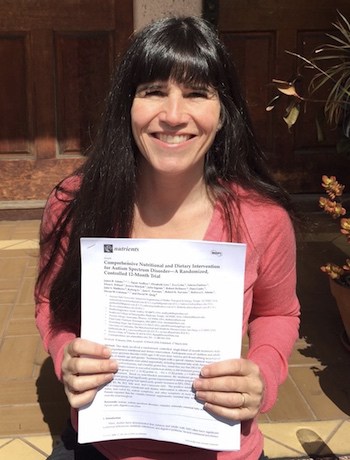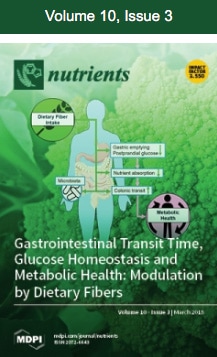Dear Friends and Colleagues,
Did you hear the exciting news? A huge dream of mine has come true!
 After 16 years espousing the science and clinical efficacy of diet and nutrition for autism, I have become a published researcher!
I was part of a study that was just published last weekend, led by Dr. Jim Adams, that researched the benefits (and synergistic effects) of six diet and nutrition interventions for autism, over the course of a year. The results are astounding!
It states, “The positive results of this study suggest that a comprehensive nutritional and dietary intervention is effective at improving nutritional status, non-verbal IQ, autism symptoms, and other symptoms in most individuals with ASD.”
This study validates nutritional intervention for autism, and paves the way for ALL families to receive nutrition support!!
It’s titled “Comprehensive Nutritional and Dietary Intervention for Autism Spectrum Disorder – A Randomized, Controlled 12-Month Trial” and was published in the esteemed journal, Nutrients. It’s an open access journal so you can download and read the whole paper here.
The study showed a 4.5x increase in developmental age over the non-treatment group and a 7 point rise in IQ!!
There were improvements in:
After 16 years espousing the science and clinical efficacy of diet and nutrition for autism, I have become a published researcher!
I was part of a study that was just published last weekend, led by Dr. Jim Adams, that researched the benefits (and synergistic effects) of six diet and nutrition interventions for autism, over the course of a year. The results are astounding!
It states, “The positive results of this study suggest that a comprehensive nutritional and dietary intervention is effective at improving nutritional status, non-verbal IQ, autism symptoms, and other symptoms in most individuals with ASD.”
This study validates nutritional intervention for autism, and paves the way for ALL families to receive nutrition support!!
It’s titled “Comprehensive Nutritional and Dietary Intervention for Autism Spectrum Disorder – A Randomized, Controlled 12-Month Trial” and was published in the esteemed journal, Nutrients. It’s an open access journal so you can download and read the whole paper here.
The study showed a 4.5x increase in developmental age over the non-treatment group and a 7 point rise in IQ!!
There were improvements in:
 We studied a comprehensive diet and nutrition intervention for autism – which consisted of 6 nutrient and diet interventions. My role was to help participants understand and follow a healthy gluten-free, casein-free, soy-free diet. I worked alongside my colleague, Dana Laake. Together we created and delivered an educational presentation and conducted one-on-one nutrition consultations.
The study measured the effects of six interventions over the course of a year. Here’s when each were introduced:
We studied a comprehensive diet and nutrition intervention for autism – which consisted of 6 nutrient and diet interventions. My role was to help participants understand and follow a healthy gluten-free, casein-free, soy-free diet. I worked alongside my colleague, Dana Laake. Together we created and delivered an educational presentation and conducted one-on-one nutrition consultations.
The study measured the effects of six interventions over the course of a year. Here’s when each were introduced:
 After 16 years espousing the science and clinical efficacy of diet and nutrition for autism, I have become a published researcher!
I was part of a study that was just published last weekend, led by Dr. Jim Adams, that researched the benefits (and synergistic effects) of six diet and nutrition interventions for autism, over the course of a year. The results are astounding!
It states, “The positive results of this study suggest that a comprehensive nutritional and dietary intervention is effective at improving nutritional status, non-verbal IQ, autism symptoms, and other symptoms in most individuals with ASD.”
This study validates nutritional intervention for autism, and paves the way for ALL families to receive nutrition support!!
It’s titled “Comprehensive Nutritional and Dietary Intervention for Autism Spectrum Disorder – A Randomized, Controlled 12-Month Trial” and was published in the esteemed journal, Nutrients. It’s an open access journal so you can download and read the whole paper here.
The study showed a 4.5x increase in developmental age over the non-treatment group and a 7 point rise in IQ!!
There were improvements in:
After 16 years espousing the science and clinical efficacy of diet and nutrition for autism, I have become a published researcher!
I was part of a study that was just published last weekend, led by Dr. Jim Adams, that researched the benefits (and synergistic effects) of six diet and nutrition interventions for autism, over the course of a year. The results are astounding!
It states, “The positive results of this study suggest that a comprehensive nutritional and dietary intervention is effective at improving nutritional status, non-verbal IQ, autism symptoms, and other symptoms in most individuals with ASD.”
This study validates nutritional intervention for autism, and paves the way for ALL families to receive nutrition support!!
It’s titled “Comprehensive Nutritional and Dietary Intervention for Autism Spectrum Disorder – A Randomized, Controlled 12-Month Trial” and was published in the esteemed journal, Nutrients. It’s an open access journal so you can download and read the whole paper here.
The study showed a 4.5x increase in developmental age over the non-treatment group and a 7 point rise in IQ!!
There were improvements in:
- Speech/communication
- Sociability
- Hyperactivity
- Behavior
- Autism symptoms
- Sensory issues
- Gastrointestinal symptoms.
 We studied a comprehensive diet and nutrition intervention for autism – which consisted of 6 nutrient and diet interventions. My role was to help participants understand and follow a healthy gluten-free, casein-free, soy-free diet. I worked alongside my colleague, Dana Laake. Together we created and delivered an educational presentation and conducted one-on-one nutrition consultations.
The study measured the effects of six interventions over the course of a year. Here’s when each were introduced:
We studied a comprehensive diet and nutrition intervention for autism – which consisted of 6 nutrient and diet interventions. My role was to help participants understand and follow a healthy gluten-free, casein-free, soy-free diet. I worked alongside my colleague, Dana Laake. Together we created and delivered an educational presentation and conducted one-on-one nutrition consultations.
The study measured the effects of six interventions over the course of a year. Here’s when each were introduced:
- Day 0: Vitamin/Mineral supplementation
- Day 30: Essential Fatty Acid supplementation
- Day 60: Epsom salt baths
- Day 90: Carnitine supplementation
- Day 180: Digestive Enzyme supplementation
- Day 210: Healthy, gluten-free, casein-free diet
- Day 365 – Final assessment
- 7-year-old boy with pica was healed entirely within one week of starting the HGCSF (healthy gluten-free casein-free soy-free) diet.
- 27-year-old male with severe ASD and a history of severe urinary retention requiring daily catheterization was able to urinate on his own about 4 days after eliminating dairy products. By the end of the study, the young man no longer needed catheterization and had zero episodes of kidney stones, urinary tract or bladder infections.
- One 9-year-old girl with severe ASD had poor strength, endurance, and energy levels at the beginning of the study. Four months after the treatment, she no longer needed her wheelchair. We found out that her pre-treatment diet was deficient in carnitine due to total avoidance of beef products.
- Multivitamin/mineral formula
- Essential fatty acid supplement
- Healthy GFCFSF diet




0 Comments